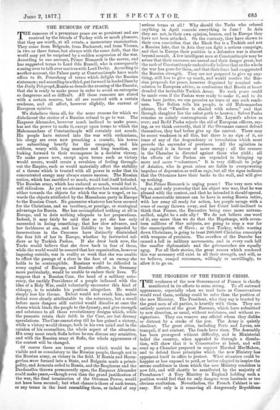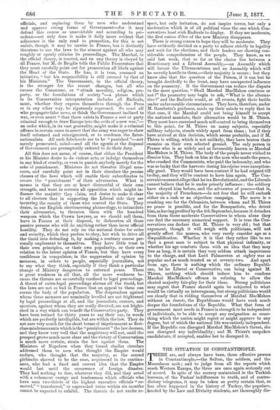THE PROGRESS OF THE FRENCH CRISIS.
THE weakness of the new Government of France is chiefly manifested in its efforts to seem strong. To all outward appearance, especially when we read facts as Conservatives would read them, nothing could be safer than the position of the new Ministry. The President, who they say is trusted by the good men of all parties, is heartily with them. They are entirely masters of the great Bureaux, which have submitted to new direction, as usual, without resistance, and without re- signations. They can remove any official whom they dislike or distrust by a stroke of the pen. The Army is quietly obedient. The great cities, including Paris and Lyons, are tranquil, if not content. The funds have risen. The Assembly has been prorogued without difficulty, and in Ministerial belief the country, when appealed to through a dissolu- tion, will show that it is Conservative at heart, and will send up a Chamber prepared to support Marshal MacMahon, and to defend those principles which the new Ministry has appointed itself to office to protect. What situation could be happier or less exposed to peril, or better adapted to inspire the serene confidence in them which the new Ministry considers is now felt, and will shortly be manifested by the majority of Frenchmen ? A Tory Ministry in England holding such a position would feel that its only dangers were lassitude or too obvious exultation. Nevertheless, the French Cabinet is un- easy. Not only is it removing all dangerously Republican officials, and replacing them by men who understand and approve strong forms of Government—for it may defend this course as unavoidable and according to pre- cedent—not only does it make it daily more evident that adherence is the only road to promotion, for this is not unfair, though it may be unwise in France, but it distinctly threatens to use the laws to the utmost against all who may roughly or openly criticise its proceedings. The Marshal, in the official theory, is trusted, and on any theory is obeyed by all France, but M. de Broglie tells the Public Prosecutors that they must carefully point out for prosecution all libels against the Head of the State. He has, it is true, assumed an initiative, " but his responsibility is still covered by that of his Ministers." The Government, in the official theory, is the stronger for the recent changes, but all who excuse the Commune, or " attack morality, religion, pro- perty, or the foundations of society "—a phrase which in its Conservative interpretation includes all Radicals, must, whether they express themselves through the Press or in any other way, be rigorously repressed. So must all who propagate false news, or think the Government inclined to war, or even assert " that there exists in France a sect or party criminal enough to draw Europe into the evils of a new war,"— an order which, in its vast generality, might make it a criminal offence in certain cases to assert that the army was eager to show itself reformed and reinvigorated, or to condemn the Inter- nationalists. All such falsehoods are to be "punished "—not merely prosecuted, mind—and all the agents at the disposal of Government are peremptorily ordered to do their duty.
All this does not mean, of course, that either the President or his Minister desire to do violent acts, or indulge themselves in any kind of cruelty, or even to punish anybody merely for the sake of punishment. Ministers do not threaten illegal mea- sures, and carefully point out in their circulars the precise clauses of the laws which will enable their subordinates to secure the " punishment " of their adversaries. What it means is that they are at heart distrustful of their own strength, and want to restrain all opposition which might in- fluence the majority they claim, and desire to make it clear to all electors -that in supporting the Liberal side they are incurring the enmity of those who control the State. They despise; in our English electioneering phraseology, to intimidate their adversaries, to threaten them with the hundred weapons which the Crown lawyers, as we should call them, have in France at their disposal, to dishearten all those passive persons who will do anything rather than incur official hostility. They do not rely on the national desire for order and security, which they profess to obey, but wish to drive all the timid into defending it, by making a contrary course per- sonally unpleasant to themselves. They have little trust in their own principles, or their own popularity, or their own relation to the latent opinion of France, but they have every confidence in compulsion, in the suppression of opinion by menaces, in orders to people, especially journalists, not to say what they think, especially if they think a particular change of Ministry dangerous to external peace. There is great weakness in all that, all the more weakness be- cause the threats are so carefully confined to legal proceedings. A threat of extra-legal proceedings alarms all the timid, but the laws are not so bad in France that an appeal to them can coerce the body of the population. The desperadoes against whom these menaces are nominally levelled are not frightened by legal proceedings at all, and the journalists, orators, and spouters, against whom they are really directed, are not fright- ened in a way which can benefit the Conservative party. They have been trained for thirty years to say their say, in words which are perfectly intelligible, but are within the law. They do not care very much for the short terms of imprisonment as first- class misdemeanants which is the " punishment " the law decrees, and they know very well that the magistracy will not, until the prospect grows much more clear and the victory of Conservatism is much more certain, strain the law against them. The Ministers of Napoleon when they issued similar circulars addressed them to men who thought the Empire would endure, who thought that the majority, as the second plebiscite showed to be the case, acquiesced in its continu- ance, who had a fixed and correct idea that the Empire would last until the occurrence of foreign disaster. They had nothing to fear, whatever they did, and they acted with a vehement energy and fearlessness which officials who have seen two-thirds of the highest executive officials " re- moved," " transferred," or superseded twice within six months cannot be expected to exhibit. The threats do not excite re- spect, but only irritation, do not inspire terror, but only a moderation which is of all political vices the one which Con- servatives least wish Radicals to display. If they are moderate, the first raison d'être of the new Ministry disappears. There is strong reason to hope they will be moderate. They have evidently decided as a party to adhere strictly to legality and wait for the elections, and their leaders are showing con- siderable comprehension of the people. They know, as we said last week, that so far as the choice lies between a Reactionary and a Liberal Assembly,—an Assembly which will favour the Ultramontanes and an Assembly which will be secretly hostile to them,—their majority is secure ; but they know also that the question of the Person, if it can but be brought decidedly to the front, may have unexpected influence on the peasantry. If the Government can reduce the dispute to the mere question, " Shall Marshal MacMahon continue or not ?" the peasantry may begin to ask, "What is the alterna- tive V" and the Radicals would, at all events, fight their battle under unfavourable circumstances. They have, therefore, under M. Gambetta's guidance, made up their minds to reply that in that case, if the Marshal could not bring himself to accept the national mandate, their alternative would be M. Thiers. They must have exercised much self-control to bring themselves to this point, for M. Thiers on many subjects, especially military subjects, stands widely apart from them ; but if they have arrived at this decision, which seems probable, and if M. Thiers is willing, which is not unlikely, they have beaten their enemies on their own selected ground. The only person in France who is as widely and as favourably known as Marshal MacMahon is M. Thiers. The body of the people never wished to dismiss him. They look on him as the man who made the peace, who crushed the Communists, who paid the indemnity, and who was so lucky that the harvests during his regime were exception- ally good. They would have been content if he had reigned till to-day, and they will be content to have him again. The Con- servatives cannot allege that he is a Revolutionist, and the Liberals cannot believe that he is under priestly influence ; the soldiery have obeyed him before, and the advocates of peace—that is, the majority of Frenchmen—do not fear that he will embark either on a rash or an objectless campaign. The move is a crushing one for the Orleanists, between whom and' . Thiers no peace is possible, and for the Bonapartists, who detest him, as having profited by the 4th September, because it detaches from them those moderate Conservatives in whom alone they can find the necessary numerical support. It is true the Con- servatives can declare that M. Thiers is very old ; but that argument, though it will weigh with politicians, will not greatly affect the masses, who very rarely consider age as a disqualification. Whether it is that they rather like to see that a great man is subject to that physical infirmity, or whether his age comforts them with an idea that they may live as long, it is certain they very seldom attach importance to the charge, and that Lord Palmerston at eighty was as popular and as much trusted as at seventy-two. And apart from age, there is nothing which the ordinary Republi- can, be he Liberal or Conservative, can bring against M. Thiers, nothing which should induce him to condone Marshal MacMahon's offence in refusing to allow the elected majority fair-play for their ideas. Strong politicians may regret that France should again be subjected to what would be virtually an interregnum, but strong politicians would see clearly that in ridding themselves of Marshal MacMahon without an &Atte, the Republicans would have sunk much deeper the foundations of the Republic. What that form of government most needs in France is strength to be independent of individuals, to be able to accept any resignation as some- thing which the nation might regret or might approve to any degree, but of which the national life was entirely independent. If the Republic can disregard Marshal MacMahon's threat, she can disregard any individuality ; and M. Thiers's unspoken candidature, if accepted, enables her to disregard it.



































 Previous page
Previous page